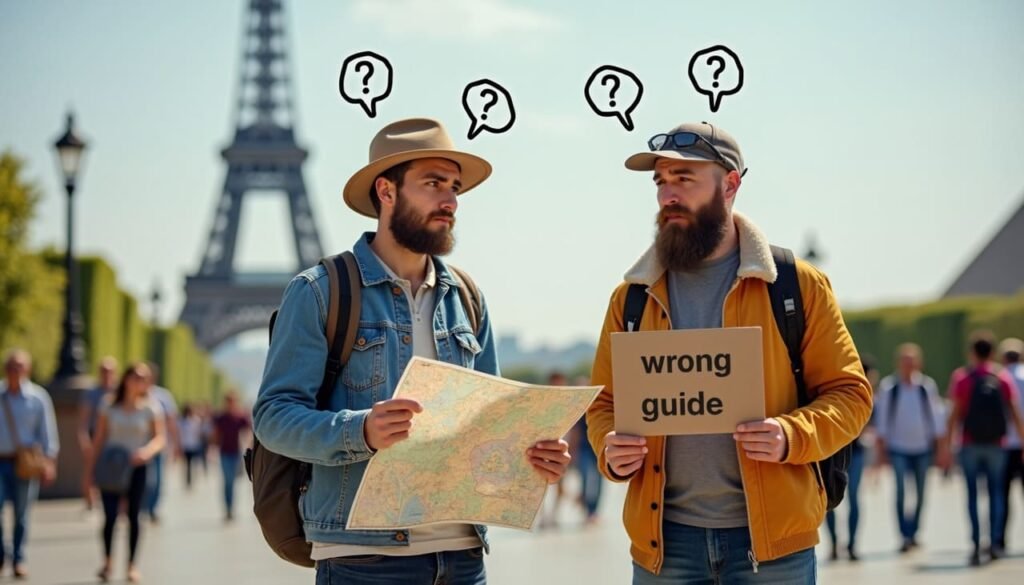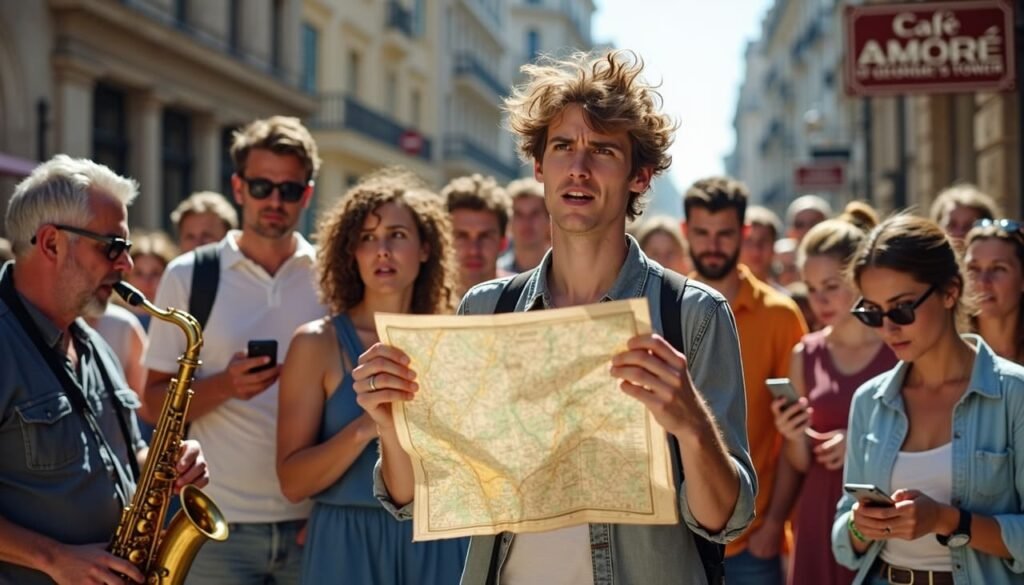A shocking 60% of travelers face terrible experiences simply because they picked the wrong tour guide. This common mistake can transform your dream vacation into an expensive nightmare. The damage goes beyond the reach and influence of just ruining your day.
Here’s a reality check – tourists often pay more than $200 hidden fees. Some travelers have lost up to $2,000 by choosing poorly. The numbers tell a grim story – 40% of travelers waste precious vacation time due to guides who can’t plan properly. Your safety and travel experience can take a serious hit when guides drag you to overpriced souvenir shops for their commission or leave you stuck in remote places.
This article shares a cautionary tale about a traveler’s $2,000 loss from a bad guide choice. You’ll discover the actual cost beyond money and get practical tips to avoid similar problems. We’ll show you red flags to watch for, what you should do if things go wrong, and how to protect yourself on future adventures.
Table of Contents
When The Traveler Hired The Wrong Tour Guide: A True Story

Mark always dreamed of learning about Egypt’s ancient wonders. His research led him to a website advertising “authentic” private Egyptian tours. The professional-looking site showcased glowing reviews and competitive pricing. Mark felt confident choosing “Ahmed” as his guide and booked a detailed week-long tour to all major historical sites.
You might like: Why Travel to New Zealand: 4 Secret Spots You Missed
“The website looked legitimate and the testimonials were convincing,” Mark would later explain. “I had no reason to doubt the guide’s credentials.” He transferred a $2,000 deposit covering transportation, guide services, and attraction entry fees. His excitement grew as he packed his bags to prepare for what he believed would be the adventure of a lifetime.
The Original Excitement and Booking Process
Mark dedicated hours to plan his ideal Egyptian itinerary, focusing on the pyramids, temples, and the Valley of the Kings. The tour company promised an experienced, English-speaking guide who knew Egyptian history well. The booking process seemed simple—maybe too simple. Mark realized he should have asked more about Ahmed’s qualifications and checked reviews beyond the website.
First Signs of Trouble on Day One
Ahmed arrived two hours late to their first meeting, yet Mark stayed optimistic. The red flags started appearing soon after. The comfortable air-conditioned vehicle was an old car with no working seatbelts.
Their first historical site visit revealed Ahmed’s vague and rehearsed explanations. Ahmed dodged questions about hieroglyphics or changed the subject. Another traveler shared a similar experience: “It became clear that the guide was reading from a script and couldn’t answer simple historical questions”.
How the Situation Escalated
The third day revealed Ahmed’s real priorities. Historical sites took a backseat to souvenir shops where he earned commissions. “He became impatient and dismissive when I refused to buy anything,” Mark recalled.
The itinerary changed without warning. Sites became mysteriously “closed” or “too crowded” to visit. Ahmed turned unpleasant when Mark voiced his disappointment. As with other tourists’ experiences, Mark spent whole days at overpriced shops instead of cultural attractions.
The Final Cost: $2,000 and a Ruined Trip
Ahmed’s sudden cancellation of their Valley of the Kings visit—the highlight of Mark’s planned trip—marked the breaking point. He cited “time constraints”. Ahmed demanded extra fees for “special access” after Mark protested.
Mark soon realized his trip was beyond saving. The $2,000 upfront payment bought him less than half of what was promised. The emotional impact exceeded the financial loss. His dream of a cultural experience became a stressful ordeal filled with arguments and disappointment.
Mark’s story reflects many travelers who choose the wrong guide. The cost went beyond money. He missed the most important historical sites and wasted valuable vacation time. His dream destination left him with bitter memories of a country he had wanted to visit for years.
You might like: Become a Travel Agent With No Experience in 2025
The Real Cost of Hiring The Wrong Tour Guide
“There is no such thing as private knowledge in academia. An idea kept private is as good as one you never had.” — Sönke Ahrens, Author of ‘How to Take Smart Notes’ and expert on knowledge management
Choosing the wrong tour guide creates problems beyond a simple inconvenience. Your wallet, time, and emotional state can take a serious hit. Let’s understand what happens when travelers end up with the wrong guide.

Financial Loss and Hidden Fees
Poor guide selection can drain your bank account fast. US travel surveys show tourists pay about $200+ in unlisted fees when guides aren’t upfront about their services. These surprise costs show up as:
- Sudden “special access” charges at attractions
- Transportation costs that weren’t mentioned before
- Extra ticket fees that should have been part of the package
There’s another reason to worry – many guides work on commission and push tourists toward expensive shops where they get kickbacks. A tourist in Marrakech paid triple the market price for souvenirs because their guide pressured them. This happens often – one solo traveler felt “disappointed and overcharged” after their guide focused on commission-based shopping instead of authentic experiences.
Lost Time and Missed Experiences
Time becomes the most significant loss during your travels. About 40% of tourists waste precious hours because their guides don’t plan properly. One family in Rome couldn’t skip the Vatican City lines because their guide hadn’t arranged tickets beforehand.
These problems mean tourists miss the very landmarks that drew them there. One case showed how poor organization led to “confusion, detours, and idle time that could have been spent exploring”. Bad guides give surface-level experiences – a tourist described it as “boring spots, skipped highlights, or even delays, making the whole trip feel rushed or poorly planned”.
Emotional Toll and Safety Concerns
The mental impact hits harder than you’d expect. Tourists end up “frustrated and disappointed” when guides don’t deliver what they promised. Things get worse when communication fails – poor guide communication leaves travelers feeling “unsupported and stranded during critical moments”.
Safety issues pose the most significant risk. An unlicensed jungle trek guide led a group through “unsafe routes and a stressful experience” because they didn’t know the area well enough. Some tourists found themselves stuck at a remote temple in Thailand with no way back. This shows how quickly things can go wrong with unreliable guides.
Research on adventure tourism guides reveals the emotional work involved in guiding. Guides often feel “fear and anxiety,” while clients expect “heroic” fearless leaders. This gap between reality and expectations creates tension, especially when guides lack training or support.
Bad experiences with guides can change how you see an entire country. What should be an amazing cultural experience turns into a stressful memory that colors your view of not just that guide, but maybe the whole destination.
How to Spot a Bad Tour Guide Before It’s Too Late

You can avoid disastrous travel experiences by spotting warning signs early. Let me help you identify these warning signs before you end up with the wrong guide.
Lack of Local Knowledge
A tour guide’s real value comes from knowing the destination inside out. Watch how guides handle questions about local history, culture, or geography. Good guides talk naturally about nearby landmarks, suggest local spots, and share stories you won’t find in tourist brochures.
Red flags include: unclear answers to specific questions, sticking to memorized scripts instead of natural conversation, and not knowing enough about neighborhoods or historical facts. Excellent guides usually have personal stories about places they show—guides who don’t might just be reciting facts they memorized.
Unclear Itinerary or Last-minute Changes
Reliable guides give you detailed, clear itineraries before you book. Stay away from guides who give vague descriptions or keep changing plans. Travel needs some flexibility, but too many unexplained changes often hide poor planning or hidden costs.
Ask for a written itinerary that lists:
- Exact locations and duration at each stop
- Transportation details
- Included and excluded costs
- Meal arrangements (if applicable)
Disrespectful or Unprofessional Behavior
You can learn a lot about the guides from your first contact. Slow replies, brushing off your questions, or pushing you to book quickly are signs of trouble ahead. Showing up late to meetings usually means they’ll be unreliable later.
Watch how they treat others. Guides who disrespect service workers or ignore cultural sensitivities will likely make your tour uncomfortable. Professional guides know where to draw the line—those who share too much personal information or ask unnecessary questions might lack proper training.
Language Barriers and Poor Communication
Your tour guide doesn’t need perfect language skills, but they should communicate clearly in your preferred language. They should explain complex ideas, answer questions thoroughly, and hold meaningful conversations.
Try asking detailed questions about your interests before booking. Good guides give thoughtful answers, not generic responses. Their written messages should make sense—if you’re confused during early conversations, it will only worsen during the tour.
Listen to your gut feeling. That uneasy feeling usually means something isn’t right about the guide’s skills or intentions.
What to Do if You’ve Already Hired the Wrong Tour Guide

You’re on your dream vacation and realize your tour guide isn’t the right fit. What next? Even the most experienced travelers sometimes have tour guides who don’t meet their needs. The good news? You can take several steps to turn things around.
Speak up and Express your Concerns
Don’t suffer in silence. Most travelers stay quiet because they’re too polite or afraid to speak up. The best way to fix problems is to address them right away. This gives your tour guide a chance to make things right before the whole ordeal ruins your trip.
When you raise concerns:
- Point out exactly what doesn’t match your expectations
- Stay calm and professional, even if you’re frustrated
- Keep photos or notes to back up your points
- Come up with specific ways things could improve instead of just complaining
A direct but respectful chat works better than keeping quiet or getting angry.
Contact the Tour Company or Platform
Your guide can’t fix the problem? Take it up with the tour company or booking platform. Good companies care about their reputation and will step in quickly once they know the situation.
Reach out through their official channels—use phone numbers or email addresses from your booking confirmation rather than going through your guide. Ask to talk to someone in charge who can help fix things. Explain the gap between what they promised and what you got.
Request a Refund or Switch Guides
After you’ve noted the problems and talked to management, ask to change guides or get your money back. Companies usually have ways to handle unhappy customers, though policies differ.
Be realistic about refunds. You might get partial money back for missed stops instead of a full refund. You could also ask about upgrading your tour or switching to a guide who’s a better match.
Leave an Honest Review to Help Others
After your trip, share what happened on TripAdvisor, Google Reviews, or travel forums. Focus on feedback that helps the company get better and other travelers make wise choices.
Tell people about:
- The specific things that went wrong
- How the company handled your concerns
- What others should do differently
Bad experiences can help stop others from running into the same issues. Your honest feedback might push the company to train guides better or change how they pick them.
How to Make Sure it Never Happens Again

“It is not possible to work intensively on one part without implications of the changes introduced arising for other points; the process of revision thus never fully catches up with itself.” — Talcott Parsons, Renowned sociologist and author of ‘The Social System’
Planning before booking a tour guide can save you thousands of dollars and prevent major headaches. The proper knowledge helps you avoid the nightmare of ending up with the wrong guide.
Get a Full Picture Before Booking
Look into your potential guide’s credentials first. Licensed guides usually have certifications from official tourism bodies – a clear sign they take their work seriously. For example, many European countries need guides to complete specific training: Great Britain has blue badge guides with 18 months of intensive preparation, France has the FNGIC certification, and Germany has the BVGD Certificate.
Check qualifications beyond their website claims. Real professionals proudly show their credentials listed on official tourism association websites.
Stick to Trusted Platforms and Check Reviews
Your best bet is to use 10-year-old platforms like TripAdvisor, Viator, or official tourist offices instead of random websites with questionable reviews. Smart review reading means looking for positive and negative feedback patterns rather than focusing on one-off complaints.
Guides who maintain professional websites usually take their work more seriously than those who only use social media. This shows their long-term dedication to the profession.
Ask These Key Questions Before Confirming
Make sure to ask about:
- Their experience in what interests you
- Whether they prefer private or group tours
- Past client references
- Precise pricing details (transportation, entrance fees, etc.)
The best guides let clients reach out during their trip with questions – this extra service makes a real difference.
Listen to Your Gut During First Contacts
Your initial conversations tell you a lot about how professional a guide is. Slow, unclear, or disorganized responses usually point to bigger problems during the tour.
Watch how they answer your questions. Do you get detailed, personal responses or generic ones? Since you’ll be in unfamiliar places, your instincts about someone’s reliability matter more than ever.
Final Words
The right tour guide can turn an ordinary trip into something extraordinary. This piece shows how quickly travel dreams can fall apart when people rush into choosing their guides. Mark’s $2,000 loss is a clear warning that the damage goes way beyond losing money.
Money problems hurt – surprise fees, forced shopping stops, and scams can drain your budget fast. Notwithstanding that, the non-financial costs cut even deeper. Time wasted, missed attractions, and safety risks leave a bitter taste that no refund can fix.
Your alertness before booking makes all the difference. Research, credential checks, and review analysis will substantially cut your risks. The questions you ask in your original talks can reveal warning signs that might stay hidden until too late.
If you end up with a bad guide even after taking precautions, quick action can save much of your trip. Speaking up, contacting management, and keeping records offer better solutions than staying quiet.
FAQs Related to Wrong Tour Guides
How can I spot a potentially wrong tour guide before booking?
Look for vague responses to specific questions, frequent last-minute itinerary changes, unprofessional behavior during initial interactions, and poor communication skills. A qualified guide should demonstrate in-depth local knowledge and provide clear, detailed information about the tour.
What should I do if I’ve hired the wrong tour guide?
First, communicate your concerns directly with the guide. If issues persist, contact the tour company or booking platform immediately. Request a guide change or refund if possible. Document any problems and leave an honest review to help future travelers.
Are there any hidden costs I should know when hiring a tour guide?
Yes, watch out for unexpected fees like “special access” charges for attractions, inflated transportation costs, or pressure to visit specific shops where guides may receive commissions. Always clarify what’s included in the initial price and ask about any potential additional expenses.
How can I protect myself from tour guide scams?
Use reputable booking platforms, verify the guide’s credentials with official tourism associations, read recent reviews, and trust your instincts during early communications. Consider travel insurance covering tour-related issues, and always have a backup plan if things don’t work out as expected.


Leave a Comment